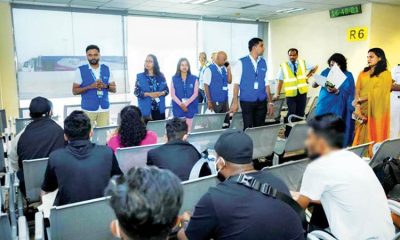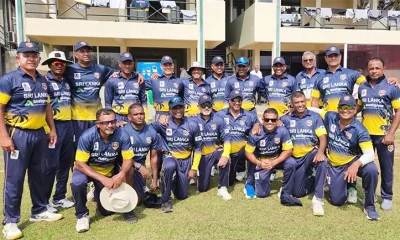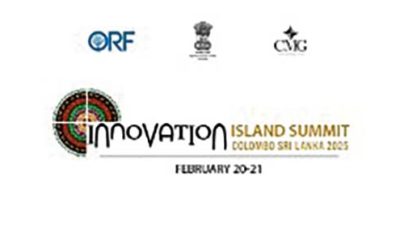Business
Right of Response to Caritas Sri Lanka

We refer to the published studies by Caritas Sri Lanka titled Research Study on the Culture and Identity of the Plantation Community in Sri Lanka and Right to Education of the Children of the Plantation Community.
At the outset, we express our appreciation to the Catholic Bishops Conference and Caritas Sri Lanka for their interest and recommendations aimed at creating an enabling environment for preserving and promoting the culture and identity of plantation communities. We recognize that the recommendations in these publications encompass a wide range of areas, including inclusive development policies, education and awareness programs, cultural preservation funding, legal protection, economic empowerment, and the promotion of culture-based tourism. While we respect the commitment of Caritas to these communities, we believe the data used in their reports should be revisited to reflect today’s on-the-ground realities. Our goal is to offer updated information so that all stakeholders can align on how best to support plantation communities most effectively today.
In that regard, we note that many of the statistics cited in the report are based on research that dates as far back as 2003/2004, failing to account for the significant progress and developments made in plantation communities since then. As the Planters’ Association of Ceylon, which represents the interests of Regional Plantation Companies (RPCs) in whose estates reside an estimated 42% of Malaiyaha Tamil community, we are compelled to clarify these points and provide a more accurate representation of the current state of these communities. We also acknowledge that further investment and effort is required from all stakeholders, including the Government in order to drive meaningful progress on the several issues. We caution however, that placing the responsibility solely with plantation companies who are only capable of operating within the constraints of employer-employee relationships fails to hold all other stakeholders accountable for their role and capacity to drive broader progress.
Accordingly, we believe It is important at the outset to address the continuous references of this community as Indian-origin Tamils (IOT). While historically, many have referred to this group as Indian-origin Tamils (IOT), today, they are recognized as Sri Lankan citizens with full political and civic rights. As proud Sri Lankans, it’s vital to celebrate the rich diversity within our nation. The Tamil community, with roots in India, is an essential part of our shared heritage. While the term IOT does hold historical and cultural significance, using it exclusively can overshadow the strides this community has made over many generations to achieve these rights, and establish their own identity as Sri Lankans. The term IOT therefore perpetuates an outdated and exclusionary narrative that risks undermining their rightful inclusion within Sri Lankan society. Now commonly referred to as the Malaiyaha community, they are an integral part of the nation’s socio-economic fabric. With a population of approximately 960,000—20% of whom form a vital, actively contributing workforce – which is increasingly transcending the plantation industry.
Education sector challenges
The assertion that education within plantation communities remains chronically underfunded is misleading. With the nationalization of schools, they were incorporated into the mainstream education system. Over time, the education system has undergone significant advancements, supported by consistent government initiatives. This progress underscores the evolution of schooling facilities and the broader education framework, which now aligns with the national mainstream education standards.Since 1977, when the government assumed responsibility for these schools, there has been a steady expansion, and today 863 schools operate within plantation areas.
In parallel, the Regional Plantation Companies (RPCs) with the support of Plantation Human Development Trust (PHDT), have collaborated—often with donor assistance—to establish 1,200 Early Childhood Development Centers (CDCs). These CDCs, staffed by trained professionals, provide not only foundational education for young children but also critical nutritional and developmental support. Through scholarship programs, RPCs have within the means available to them further facilitated opportunities for higher education, with over 100 students from plantation communities entering Government universities each year. With greater support, such positive initiatives could be drastically amplified. While we acknowledge that resource constraints continue to pose challenges, we also wish to give equal and fair emphasis to the tangible gains already achieved. By building on these successes, we aim to ensure that schools serving plantation communities are strengthened, rather than diminished, as Sri Lanka collectively addresses its nationwide education funding needs.
Similarly, health outcomes within RPC-managed plantations have seen vast improvements due to targeted interventions led by RPCs with the support of PHDT. The infant mortality rate, which the publications erroneously state as 60.6%, is now 9.07% under RPC-led estates, aligning closely with national averages. Undernutrition, another cited issue, has also received significant attention, with several targeted programmes having been launched aimed at ensuring comprehensive maternal and child health support to communities within the estates. As a result of these practices, current prevalence of moderate and severe undernutrition stands at 15.57% and 3.9%, respectively, a significant improvement over previous decades.
The studies also portray the housing situation within plantation estates inaccurately. The line rooms, which were historically used for worker accommodation, have been systematically upgraded or replaced under RPC-led initiatives. Over 140,000 housing units have been reroofed, ensuring improved living conditions. In addition, more than 60,000 families now reside in individual/improved housing units with modern facilities. Furthermore, 230,000 individual latrines have been constructed, significantly enhancing sanitation and hygiene within these communities. These ongoing development programs have transformed living conditions, ensuring privacy, sanitation, and dignity for plantation workers and their families. We also note that cultural and identity-related challenges faced by plantation communities are not ignored. RPCs have actively worked to preserve cultural practices while facilitating integration into broader Sri Lankan society. Programs focusing on community engagement, cultural events, and skill development have helped foster a sense of belonging and empowerment. The work carried out by the RPCs with the support of PHDT, trade unions, and government authorities, has been instrumental in driving these advancements. Through this tripartite collaboration, RPCs have achieved measurable progress in improving the quality of life across all facets, including education, healthcare, housing, and economic opportunities.
The Planters’ Association wishes to clarify that the report does not capture the true nature of plantation communities within RPC-managed estates, unfairly painting a negative picture of the entire sector without considering the substantial improvements led by RPCs. This demarcation is necessary to ensure a fair and accurate understanding of the progress made and the ongoing commitment to the welfare of plantation communities.
(The Planters’ Association of Ceylon)
Business
NDB reports highest-ever Group PBT, surpassing Rs. 24.0 Bn

National Development Bank PLC (NDB) announced a record-breaking profit for the financial year 2024, marking a significant milestone in the Bank’s growth trajectory. All key performance indicators (KPIs) and shareholder metrics showed substantial improvements, reflecting the Bank’s resilience and commitment to delivering value.
NDB’s Director/ Chief Executive Officer Kelum Edirisinghe commented on the performance. “We are proud of our performance in FY 2024, which demonstrates our financial strength and our ability to adapt in a reviving and evolving economic landscape.
“Our FY 2024 results were driven by a focused strategy that improved operational efficiency and enhanced customer engagements. As highlighted in prior press communications, we centered our efforts on three key pillars: driving transactions, enhancing portfolio quality and increasing net interest margins. Our efforts came in to fruition with the Bank delivering healthy growth in the respective areas which translated to enhanced profitability.
“For the period under review the Bank reported a pre-tax profit of Rs. 24.3 Bn up 141% over 2023 inclusive of the one-off gain of Rs. 12.8 Bn stemming from the ISB restructure. Excluding this gain, our pre-tax profit from the underlying business grew 31% year on year, affirming the resilience of our business model.
“As we reflect on the year gone by, it is clear that 2024 has been a year of tremendous collaboration, where all our key stakeholders – our shareholders, employees, customers, business partners, – have made significant contribution to our shared value journey. I remain deeply thankful to each one of them for their unwavering support and dedication.
“As we look to the future, NDB remains committed to driving sustainable growth, aligned with national priorities whilst empowering all our stakeholders to unlock lasting prosperity. Our focus on environmental, social, and governance (ESG) principles continues to be at the heart of our efforts, ensuring we make a positive impact on the wider ecosystem”, he concluded.
NDB recorded a post-tax profit of Rs. 9.0 Bn for the financial year ended 31 December 2024, a 68% increase over the prior year 2023 (YoY). Group profit attributable to shareholders was Rs. 9.8 Bn, again an impressive growth of 70% YoY. Profit before tax at Bank and Group level were Rs. 24.3 Bn and 25.7 Bn respectively, making them the highest-ever profitability figures the Bank and the Group have posted in its 45 years plus history.
(NDB)
Business
Future Connect: Hutch and University of Sri Jayewardenepura kick off exclusive knowledge-sharing series

Hutch collaborated with the Faculty of Computing at the University of Sri Jayewardenepura to conduct an exclusive knowledge-sharing session for third-year undergraduate students. The event, held at the university, was part of Future Connect, an innovative initiative aimed at preparing the next generation for the technologies of tomorrow. By bridging the gap between academic learning and real-world applications, the event highlighted Hutch’s unwavering commitment to empowering young minds with the skills and insights needed to thrive in an ever-evolving digital landscape. With a focus on emerging trends and future technologies, Future Connect ensures that students stay future-ready and equipped to become the tech leaders of tomorrow…
The session covered key topics in telecommunications, starting with data communication and networking, including network traffic analysis, troubleshooting, and optimizing for real-time applications. Legal and ethical aspects of data transmission and strategies for assessing network performance were also discussed. The focus then shifted to enterprise resource planning (ERP) systems and their role in customer management, supply chain, HR, and billing. The day concluded with a session on soft skills, including CV writing, interview preparation, and career development.
Prof. Prasad M. Jayaweera, Dean of the Faculty of Computing, University of Sri Jayewardenepura, emphasized the importance of such collaborations, stating, “We are delighted to collaborate with Hutch in this knowledge-sharing initiative, which bridges academia and industry. This session not only enriches our students’ understanding of real-world applications but also inspires them to innovate and excel in the evolving field of technology. Partnerships like these are instrumental in shaping the future of computing professionals in Sri Lanka.”
Saumitra Gupta, CEO of Hutch Sri Lanka, shared his thoughts on the initiative, saying, “At Hutch, we believe in empowering the next generation with the tools and insights they need to thrive in a digital-first world. Collaborating with the University of Sri Jayewardenepura allows us to share our industry expertise, fostering innovation and nurturing talent that will drive Sri Lanka’s technological advancements. We are proud to support the development of future leaders in technology.”
This initiative highlights Hutch’s steadfast dedication to technological advancement and education, reaffirming its position as a leader in knowledge-sharing and innovation in Sri Lanka.
HUTCH Sri Lanka, a subsidiary of CK Hutchison Holdings (CKHH), is a major player in the Sri Lankan telecom industry. CKHH, a Hong Kong-based Fortune 500 conglomerate, operates in over 50 countries across six sectors, including Telecommunications, and reported revenues nearing USD 60 billion in 2023.
Entering the Sri Lankan market in 1997, HUTCH has grown significantly, launching GSM services in 2004, 3G in 2011, and 4G in 2018. The 2019 acquisition of Etisalat Sri Lanka further strengthened its market presence, enabling it to serve customers on both 078 and 072 prefixes. Currently, HUTCH’s 4G network covers 95% of Sri Lanka’s population, and the company is 5G-ready to support the nation’s digital aspirations.
With affordable, reliable connectivity, HUTCH serves as a key driver in Sri Lanka’s telecommunications growth, expanding access to communication, business efficiency, and entertainment across even the most remote regions.
Business
British Council announces support for three Sri Lanka-UK collaborations through Connections Through Culture Grant Programme

The British Council has announced the recipients of the 2024 Connections Through Culture (CTC) Grant Programme, with three Sri Lankan projects awarded grants for the first time since the programme’s inception.
Initially founded as a platform for fostering vibrant collaborations between artists in the United Kingdom and the East Asia-Pacific, this year’s grant cycle, however, marked an exciting milestone as the programme expanded to include South Asia, welcoming grantees from Sri Lanka and Bangladesh alongside those from Australia, New Zealand, China, Indonesia, Thailand, Malaysia, Myanmar, the Philippines, and Vietnam.
The British Council’s CTC Grant Programme stands as a testament to the organisation’s commitment to cultivating international artistic connections and promoting the exchange of ideas and creativity. The programme supports 84 innovative projects this year, three of which are collaborations between participants from the United Kingdom and Sri Lanka, cultivating stronger cultural partnerships in the Asia-Pacific that transcend borders; fostering dialogue, innovation, and mutual understanding.
-

 Sports6 days ago
Sports6 days agoRemarkable turnaround for Sri Lanka’s ODI team
-

 Features6 days ago
Features6 days agoScammed and Stranded: The Dark Side of Sri Lanka’s Migration Industry
-

 Business6 days ago
Business6 days agoUN Global Compact Network Sri Lanka: Empowering Businesses to Lead Sustainability in 2025 & Beyond
-

 Features5 days ago
Features5 days agoDon’t betray baiyas who voted you into power for lack of better alternative: a helpful warning to NPP – II
-

 News3 days ago
News3 days agoCommercial High Court orders AASSL to pay Rs 176 mn for unilateral termination of contract
-

 Sports2 days ago
Sports2 days agoSri Lanka face Australia in Masters World Cup semi-final today
-

 Features5 days ago
Features5 days agoTwo films and comments
-

 News6 days ago
News6 days agoInnovation Island Summit 2025, Colombo, Sri Lanka











